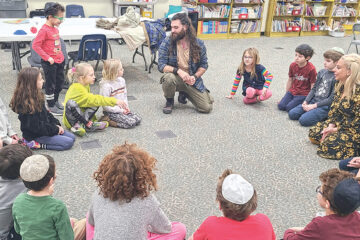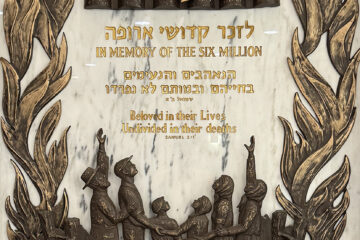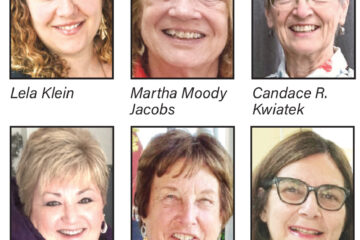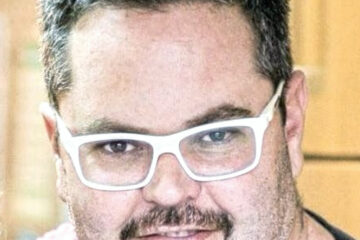Slain pawnbroker recalled as hero

By Marshall Weiss, The Dayton Jewish Observer
There was hardly a place to stand when the funeral service for Ilya Golub began on Dec. 25 in the chapel at Beth Jacob Cemetery. Members of the Russian-Jewish community, friends, business associates and neighbors came to remember the hard working, gregarious Golub, who was gunned down at the pawn shop he managed three days before.
“What can we say at a moment like this?” said Rabbi Nochum Mangel of Chabad of Greater Dayton to those present at the service.
“How can we make sense of such a senseless crime? Now is not the time for philosophizing or reasoning.”
On Dec. 22, Golub, 53, was shot at the Cash To Go Pawn Shop at 3694 Salem Ave. in Dayton. Armed with a gun, Golub fired back at his assailants, killing one.
According to Montgomery County Sheriff Phil Plummer, four people from Michigan were involved in the attempted robbery which turned deadly: Darren Taylor, now in custody in Detroit and awaiting extradition; Larry Baker, still at large; Anthony McClain, who died from gunshot wounds after Golub fired back; and a fourth suspect, allegedly a female, who drove their van and stayed in the vehicle during the crime.
Plummer said via a phone interview that two of the men were armed and the third had a backpack to collect the money.
“He (Golub) fired back at definitely the two armed individuals,” Plummer said. “He actually hit the one as he was running out the door.”
Golub, his wife of 33 years, Sarina, and their grown children, Rita and Edward, were among the Jews from the former Soviet Union brought to the Miami Valley by the Jewish Federation of Greater Dayton in the 1980s.
Judy and Dr. Mel Lipton were Federation volunteers who helped ease the transition for Russian-Jewish émigrés at that time.
“They got off the plane and were smiling and as happy as could be,” Mel Lipton recalled of the first time he met the Golubs. “He (Ilya) wanted to get started. He was ready to go. He got his citizenship as soon as he possibly could. He liked what he was doing, but he was always aware that things could happen.”
Judy Lipton said, “They came here for the kids. In a way, he was kind of like a happy-go-lucky kid would be.”
Bob Steiger, who visited Golub’s store on occasion, described him as a hard worker. “He always liked to shake my hand,” Steiger said. “He was in there by himself, the times I stopped by, which he probably shouldn’t have been.”
“God brought this family to America, to these shores, to live freely, to remain Jews, and to live as Jews openly, not having to hide their Judaism and be proud of it,” Rabbi Dovid Gibber from the Agudah Shul of Ave. H in Brooklyn told the gathering at the funeral. Gibber is the rabbi of Golub’s parents, Shmil and Lyubov Golub. “But now God said, ‘I want my precious Ilya back,’” Gibber added. “And what can we say to Him?”
Gibber said that at great personal risk in the Soviet Union, Golub’s father saw to it that he and his two brothers were “brought into the covenant of bris milah (circumcision). And it was very dangerous,” he said. “It had to be done with utmost secrecy.”
Ilya Golub, the youngest of five siblings, called his parents on his way to work every day; he was on the phone with his father only a few minutes before the shooting.
His son-in-law, Alex Lashchuk remembered Golub as the bravest man he had ever met.
“He always said that his family gave him strength and he was ready to give his life for them,” Alex said at the funeral. “He lived for us. He put his life on the line every day for us. This was the only way he thought he could give us a bright future. He fought valiantly for every dollar he brought into his family, for every gift he has ever given us.”
Mangel related that Golub’s daughter, Rita, said when she’d ask her father what kind of gifts he would like, he’d say, “I have everything I need. I am happy with what I have.”
Sarina Golub, whose mother died only a month before her husband, rose at the funeral and spoke. “I am proud that I was his wife and I will be his wife forever,” she said. “He was a mensch, a real man. He was my mensch.”
“Evil cannot ever be explained,” Mangel said to those at the funeral. “We are not meant to become comfortable with it, to accept it, to believe that we have some type of answer to it. But God assures us, ‘I am with you in the pain and the tragedy.’ The only answer to evil is doing good. We must do something to change our community’s atmosphere.”
A month after the crime, the Cash To Go Pawn Shop sits vacant, its loans transferred to Ohio Loan Co. down the street. But a memorial set up by Golub’s friends remains where he was slain: withered potted plants, American flags and flowers on the sidewalk, stuffed animals and a Star of David on the door. Family members have posted signs expressing their appreciation.
Plummer said it’s more common for pawn shops to be broken into after hours than to experience an armed assault such as this one.
“Unfortunately right now, a lot of our stores are getting robbed, mostly convenience stores,” Plummer said. “This is around the holiday season, which is always a spike in robberies.”
He added that people need to be vigilant — to be good witnesses — when a crime occurs.
“These are tough times right now,” he said. “People are struggling and people are desperate.
Due to desperation, people are self-medicating. We have a lot of heroin issues right now. Once they’re addicted to that, they’re robbing everybody to feed their addiction.”
Mel Lipton said that when he and Judy learned Golub had been murdered, they said at the same time, “This is what he had to come to America for?”





